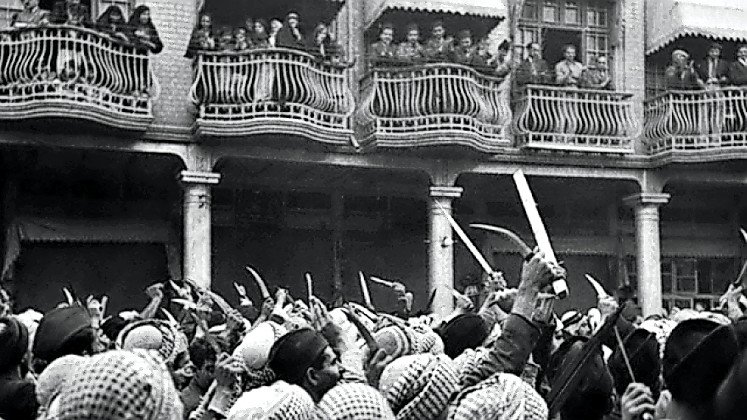Here’s why we need to remember the Farhud
Iraq is in the news again, this time due to its passage of a “draconian” law that forbids contact between Israel and Iraqi citizens on pain of death. Several Arab states have embraced normalization with Israel in the wake of the Abraham Accords. They have signed trade deals, established air links and encouraged tourism, but Iraq has bucked the trend.
The law was proposed by the largest party in the Iraqi parliament, led by the pro-Iran Shi’ite leader Muqtada al-Sadr. It was passed by an overwhelming majority. Although anti-Semitic and anti-Zionist laws are already on Iraq’s statute books and have been used to chase out Iraq’s Jewish community, the al-Sadr law extends its remit to Kurdistan, where Kurds have been open about their sympathy for Israel.
It is ironic that the al-Sadr law was passed within days of the 81st anniversary of the worst catastrophe to strike the Iraqi Jewish community: The 1941 massacre of hundreds of Jews in the wake of the defeat of Iraq’s pro-Nazi regime led by Rashid Ali al-Kilani. It has been known ever since as the Farhud.
In an awful coincidence, the slaughter took place during the festival of Shavuot on June 1 and 2, 1941.
“On the first night of Shavu’ot we usually go to synagogue and stay up all night studying Torah,” said Heskel Haddad, now a veteran ophthalmologist in New York. “Suddenly we heard screams: ‘Allah Allah!’ and shots were fired. We went out to the roof to see what was happening, we saw fires, we saw people on the roofs in the Jewish quarter screaming, begging G-d to help them.”
• • •
The violence continued through the night. Jewish homes were targeted by a red handprint, or hamsa, painted on their walls. Haddad remembers that the mob came down his street at dawn, and he watched them from the roof as they looted his neighbor’s house.
“My father had a dagger in his hand and a pipe to prevent people from attacking us on the roof,” he recounted. “An idea came to me and I took some bricks from breaking the walls and started throwing them. Other kids came with me and began throwing rocks on these people. And when we hit somebody and they began to bleed, they began screaming ‘Allah!’ and they left. And they left the loot behind them.”
Some families bribed policemen to guard them, paying half a dinar for each bullet fired. Others owe their lives to Muslims who risked their lives to protect their Jewish neighbors.
The Farhud was caused by a toxic mix of Nazi influence and propaganda, anti-colonialism that scapegoated the Jews as a fifth column and militaristic nationalism. Many blame the pro-Nazi Mufti of Jerusalem, Haj Amin al-Husseini, who together with 400 Palestinian and Syrian exiles incited anti-Jewish hatred during the two years he spent in Baghdad.
But some argue that the shadowy figure of Yunis Bahri did more harm than the Mufti. Bahri broadcast radio propaganda from Berlin. In coffee shops, Iraqis huddled around shortwave radios to hear his broadcasts. They always started with the call Huna Berlin. Hayii al Arab — “This is Berlin. Arab greetings.”
The power of Bahri’s broadcasts cannot be discounted. Four days before the Farhud broke out, he took to the airwaves to incite Arab listeners to violence. “The biggest enemies of mankind,” he declared, “are those who believe the Jews.”
• • •
The Farhud was unprecedented in the recent history of the Jews of Iraq, the world’s oldest diaspora community. It had such a traumatic effect that within 10 years after the regime began to persecute its Jewish citizens in revenge for its failure to defeat Israel in 1948, most of the community fled as soon as they were able. Today, only three Jews remain in Iraq out of a 1948 population of 150,000. Most of those who were pushed out have resettled in Israel.
The name Farhud means “forced dispossession.” It is a euphemism for brutal murder, mutilation, drowning, poisoning and looting. It was the first of several lethal riots that preceded the establishment of Israel in 1948. These outbreaks of violence, together with a raft of anti-Jewish laws passed in Arab League countries, reminiscent of the Nazi Nuremberg laws, convinced Jews in the Arab world that they had no future in the independent Arab states that emerged from the colonial era.
Why do we need to remember the Farhud?
Because the Farhud and the anti-Semitic rejectionism embodied in the al-Sadr law constitute a continuum. Iraq never signed a peace treaty with Israel and is still at war with it. The rejectionist baton has been passed from those who incited the Farhud to al-Sadr’s Iranian puppet-masters, who deny the Holocaust even as they express their desire to repeat it.

 39.0°,
Fair
39.0°,
Fair 





